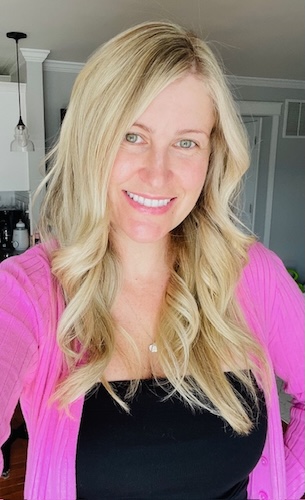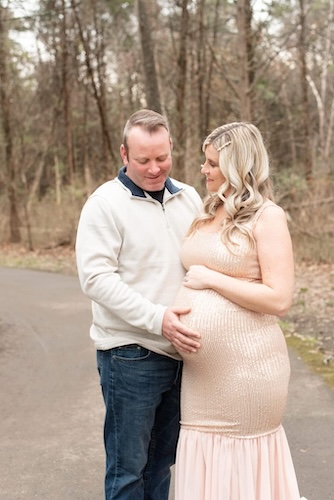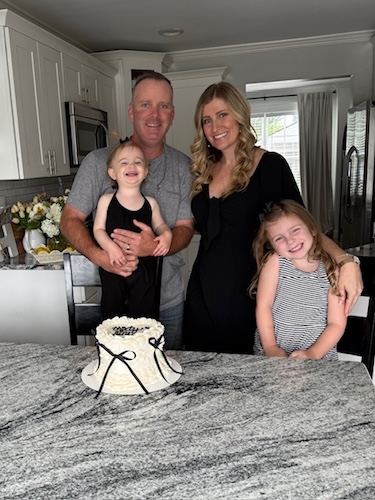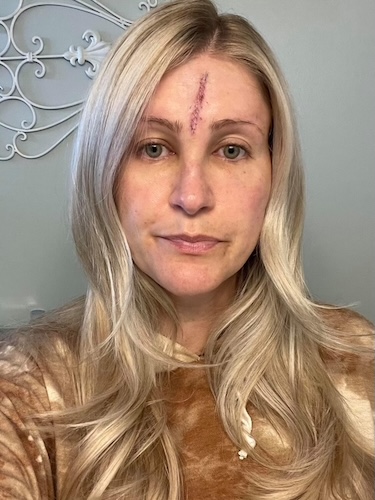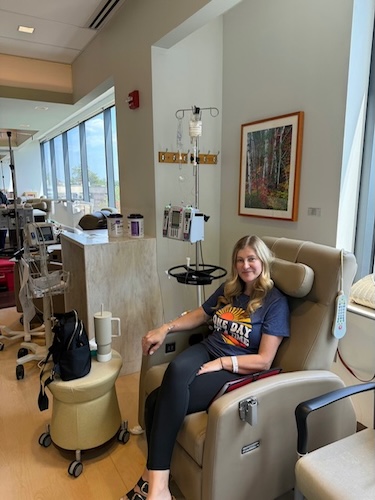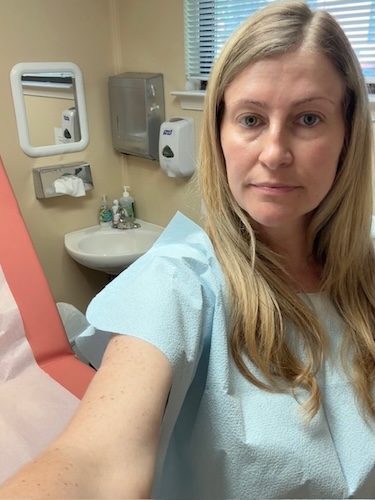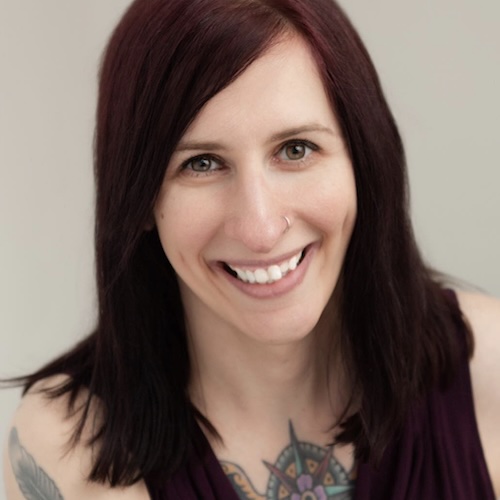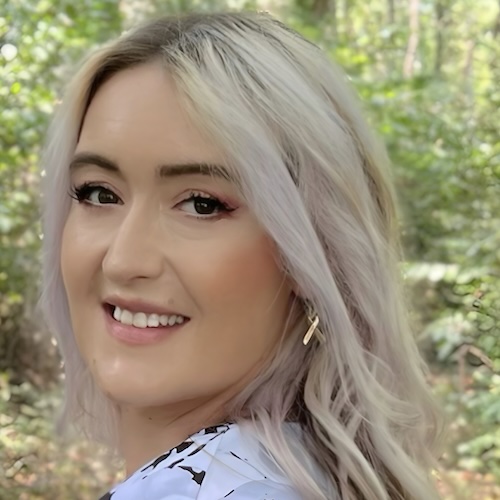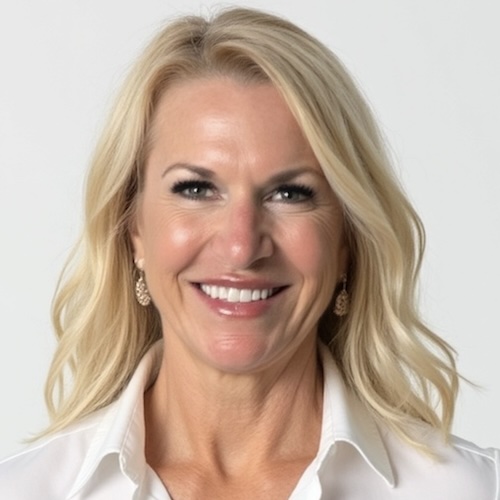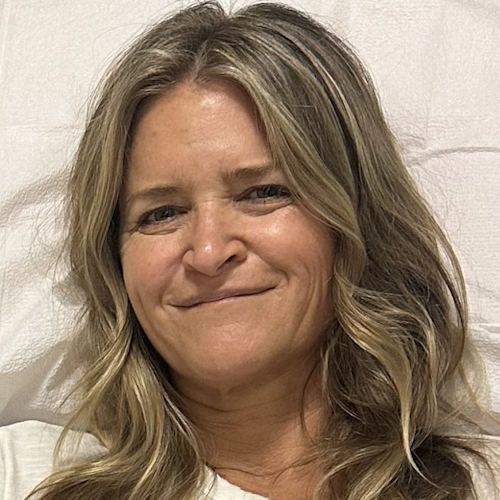From Persistent Cough to Stage 4 Melanoma: Jennifer’s Story of Taking One Day at a Time
Jennifer was recently diagnosed and treated for stage 4 melanoma that had spread to one of her lungs. Looking back, she recalls the months leading up to her diagnosis with a mix of clarity and disbelief. It all started with a lingering cough after a bout of flu in April. The cough interrupted her nights, worried her family, and slowly escalated to chest pain. She shrugged it off as a seasonal allergy until her aunt, a melanoma survivor, urged her to get a chest X-ray. That step was pivotal. It led to the discovery of a large mass and a life-changing diagnosis of metastatic cancer.
Interviewed by: Taylor Scheib
Edited by: Chris Sanchez
Hearing those words triggered a flood of fears, mostly about her husband and two young daughters, and the thought of not being there for them as they grew up. However, Jennifer quickly learned to surround herself with a good care team and to access accurate information. Instead of spiraling through online worst-case scenarios, she leaned on her doctors, who immediately set her up for scans, immunotherapy, and ultimately, an emergency surgery that removed her entire left lung and part of the pericardium. (Editor’s Note: The pericardium is the protective, fluid-filled sac that surrounds the heart.) Her voice was impacted, too, because the tumor had intertwined with her vocal cord, but she began exploring treatment options with patience and optimism.
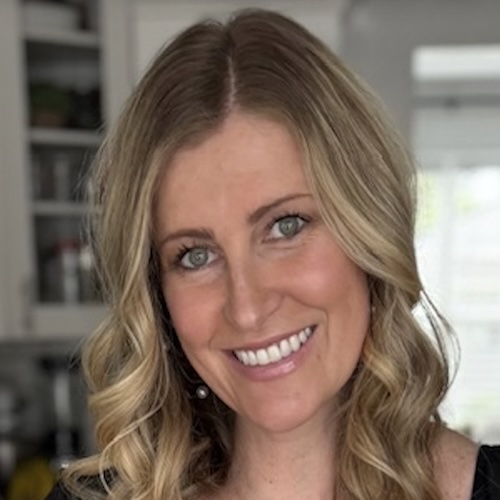
Throughout this process, Jennifer has discovered that managing mental health is just as important as the physical side of cancer care. She allows herself to cry, openly shares her fears with her husband, and is very grateful for her extensive family support system. Leaning on others hasn’t come naturally to her, but she now sees it as a powerful act of self-care.
Prevention has also become an anchor in Jennifer’s life. Growing up, she spent years in the sun without protection, even using tanning oils during her teens. After her first brush with melanoma in 2021, she became vigilant, wearing hats, sunblock, and UV-blocking shirts, and making sure her daughters are always protected. She hopes others will take sun safety and the risk of skin cancer seriously long before it becomes a necessity.
Looking ahead, Jennifer embraces each day as a chance to grow stronger. She has regular scans done, continues immunotherapy, and plans fun family activities that remind her that staying hopeful matters. She urges others to understand that a stage 4 melanoma diagnosis is frightening, but it can’t erase who you are or overcome the love that surrounds you.
Watch Jennifer’s video, and scroll down to read the transcript of her interview. You’ll learn more about her heartening story:
- How a simple chest X-ray changed her life forever
- How Jennifer parented two little kids while navigating stage 4 melanoma
- What she wishes she’d known about sun safety in her 20s
- The emotional impact of learning to rely on others for support
- How Jennifer continues to find hope, strength, and joy every day
- Name: Jennifer M.
- Age at Diagnosis:
- 38
- Diagnosis:
- Melanoma
- Staging:
- Stage 4
- Symptoms:
- Persistent cough
- Body and chest aches and pains
- Night sweats
- Fatigue
- Treatments:
- Immunotherapy
- Surgeries: lung resection, pericardiectomy
This interview has been edited for clarity and length. This is not medical advice. Please consult with your healthcare provider to make informed treatment decisions.
The views and opinions expressed in this interview do not necessarily reflect those of The Patient Story.
- Hi, I’m Jennifer
- When I first felt like something was “off”
- Looking back, I had other symptoms
- The moment everything changed
- Finding the right care team
- My diagnosis progressed quickly
- We had to do surgery immediately
- Navigating the emotions of going through emergency surgery
- I only have one lung now
- How the surgery impacted my voice
- How I’m adjusting to having one lung
- I’ve dealt with melanoma before
- My family has a history of melanoma
- What I want people to know
Hi, I’m Jennifer
I’m 39 years old and I was diagnosed with stage four metastatic melanoma on July 1st, right before my 39th birthday.
When I first felt like something was “off”
This past April, I got the flu. I went to my family doctor, and she said, “The flu in April. How does that happen?” But I did have the flu, and I was treated for it.
Months went by, and I still had this persistent cough. I would have these coughing fits. I would wake up in the middle of the night, constantly coughing. I would wake up my husband and my daughter, and I would be like, “What is going on? Why do I have this cough?”
So I thought that it was maybe just a cough from the flu. I ended up going to my family doctor, and some tests were done. I didn’t have the flu or strep throat or anything like that. We just chalked it up to seasonal allergies. So I left, I bought some Claritin, and hoped that that would resolve the issue.
Well, as time went on, I still had the cough, and then at that point, I was starting to get some chest pain. So, I was at a family barbecue and my aunt, a melanoma survivor, said, “You know, Jen, I had a conversation with my dermatologist, and any time that someone has melanoma or a history of melanoma, a lot of times they would recommend a chest X-ray. Why don’t you get a chest X-ray and see what happens, just to rule out anything significant?” That was at the end of June, July 1st. I called my doctor right away. I said, “Why do I still have this cough? Can I have a chest X-ray, please? Let’s find out what this problem is.”
It was the next day. My doctor called me up. She said that the X-ray came back, and it was abnormal, and she wanted to order a CT scan right away. I freaked out. The next day, fortunately, I was able to get in for a CT scan. At that point, she brought me right into the office, and that’s when she said that they had found a mass. It was very large already, 11.4cm. I was like, “How did that happen? How did that grow inside of me? For a long time, and I didn’t know it?” Everything happened so quickly. So, we had the X-ray first. The next day was the CT scan, and then they referred me to MD Anderson for treatment. “You have an appointment next Tuesday. You’re going to go in for a consult, and then they’re going to basically take over.”
Looking back, I had other symptoms
Looking back, I feel like I should have noticed other symptoms.
I was definitely tired. I was more tired than usual. My daughter had just finished school at that point, and I just felt tired from looking back. It was her first year of preschool, so I felt tired. She was in school. I had my little one at home, and I would get in this routine where my husband would come home and I’d be on the couch watching TV. So I wasn’t getting out as much as I normally do.
I’m always on. I’m always on the go. Always outside. I took my first daughter out shopping and just out for walks and things like that. And with my second daughter, I just felt really tired, and I just chalked it up to being a tired mom. I didn’t think anything of it. But now looking back, I should have known that my body was telling me that something was going on. Aside from the cough, I did have slight chest pain around my heart. And that came a little bit later. But it wasn’t normal. I wish I had done things differently, but I can’t think that way because what’s done is done at this point.
The moment everything changed
Right away, you just think, “How long do I have?” You know you have to stay off Google because when you go on Google, you read the words and immediately think, “I don’t have much time left.” My immediate thought was, “Am I going to be able to see my daughters grow up? Is my husband going to have to raise them alone?”
Initially, that was the scariest part, trying to navigate the feelings of what their future might look like without me. But I went back to the doctors because they were just such a great team. They give you options, the different treatment plans, and it makes things a little bit easier to know that you have those options. And you try to read success stories about the different medications and what’s available to you.
Finding the right care team
The team of doctors there has been nothing short of amazing. I mean, I’m really blessed. Right away, they did an MRI of my brain. They did a PET scan. Fortunately, the MRI did come back clear, but the PET scan basically revealed what they had already seen in the CT scan. The melanoma had metastasized to my lung and was basically a huge mass taking over my entire left lung.
The thoracic surgeon that I met with, I can’t say enough good things about him. So aggressive, but in a good way. Not pushy. Smart. Just really brilliant. They all had a plan. There was a team of oncologists and pulmonologists. They had this plan, and they executed it very quickly.
My diagnosis progressed quickly
After those big tests were done, it was decided that I was going to go through with immunotherapy. So, I had my first round of immunotherapy on July 28th. Only a couple of weeks had gone by between the time that I had the X-ray and the immunotherapy.
I had my first round, and the following day, a nurse called and asked how I was doing. And I was really out of breath and having a hard time speaking, and she went, “You don’t sound too good.” And I said, “Yeah, I was trying to take a nap and I’m just having a hard time breathing. She advised me to go to the emergency room.
So I did, and my heart rate was very high. They saw that something just wasn’t right. So there were a couple of different plans. They were going to do a couple of different procedures to maybe open up my airway a little bit more. I had a thoracentesis to remove some fluid in my back, and there was no relief with any of that.
That Friday, my doctor came into my hospital room. He said, “We have to get this thing out now. We can’t wait any longer.”
We had to do surgery immediately
The initial plan was to go through with the immunotherapy to shrink the tumor, because it was just so large. They didn’t want to go in right away because it was like sitting on my diaphragm. It was intertwined with important nerves that they didn’t want to have to touch. So the plan was to go through the immunotherapy and then get some scans done and see if it’s shrunk, and then at that point remove it. But because I ended up in the ER, and because my heart rate was just so high and they couldn’t bring it down, they decided that they had to go in to remove it.
When the thoracic surgeon came in, he said, “This surgery is very hard, very complex. It’s a huge tumor. There’s a 10% chance that you might not make it. And that’s a very high number for surgery. We don’t like to see 10%. But if we don’t do the surgery, there’s a chance that you may not make it two more days.”
So I said, “Well, let’s do it, let’s remove it.” I had to call my husband, my mom, and my dad, and tell them there was a change of plans. “We have to have surgery tonight.”
Navigating the emotions of going through emergency surgery
My husband is very stoic. He put on this strong front and pretended that everything was fine. But I know that it was super hard for him. Just because, again, a life without our girls’ mother. Who wants to think like that? But that’s where we went. That’s where my mind went. And he saw how upset I was. But he was just so supportive. And I’m so grateful for him.
During this past month and a half, I’ve cried a lot. I’m super emotional about the whole situation. He just lets me cry, tells me it’s going to be okay, and pushes me to be positive. Anytime my mind goes to that dark place, he kind of brings me back and just tells me, “We’re going to be okay. We’re going to fight this, we’re going to beat it. You’re going to be here for a very long time.” So I’m grateful for his mindset. But yeah, it’s hard not to go to the dark place.
I only have one lung now
So they took out the whole lung. And the cancer was actually creeping up to my heart, so they actually had to take out the outer layer of the heart, too, the pericardium. That’s why my breathing was such a struggle, because it was aggressively moving up to my heart. That’s why they had to go in so quickly. To remove the lung and the tumor.
Once they got it all, I was told that my margins are clear, which is excellent. But there’s always that chance that there could be small cancer cells and fluids in there, and that it could come back. So the hardest part is being fearful of the future.
Moving forward, every three months, I’ll get PET scans to monitor me. And it’s going to be scary every time I have to go in, because I’m fearful of the cancer returning. But I’ll continue with immunotherapy, I believe, for up to a year for preventative purposes. And I’m all for that.
I’ll do whatever I have to do to make sure that this doesn’t come back.
How the surgery impacted my voice
Of course, before the surgery, the nurses and doctors come in and tell you about the risks of the surgery. And there are just so many things that could have gone wrong. Fortunately, none of them did. But when they were inside, they found that the tumor had wrapped itself, not only around the lung, but also around the nerves and all kinds of veins. I guess it was just intertwined. So they told me that they might have to cut a certain vein, artery, or nerve if it came down to it.
After the surgery, when I woke up and tried to talk, I was very raspy. And that’s understandable because they had tubes down my throat. But the doctor did let me know that, unfortunately, because the left vocal cord was wrapped around the tumor, they did have to sacrifice it. So he informed me that the left nerve was cut. But the right nerve was still fine. So basically, my voice actually sounds a lot better. It was really raspy and really low for the first couple of weeks.
But what’s going to happen is, because the left vocal cord is now paralyzed, I have several options. I can get an injection in my nerve of the vocal cord, and that will plump it up so the right one doesn’t have to do all the work. And that could temporarily give me my voice back. For a more permanent option, there are two surgeries I could go through that I’m researching and considering what I think is best. One involves inserting an implant behind the vocal cord. The other involves wrapping a good nerve around the bad nerve and moving my voice box.
I don’t know if I want to go through that right now. I’m going to try just the injection, the temporary fix, and see how that goes. And then maybe down the road, I’ll consider one of the two surgeries to hopefully restore my voice.
How I’m adjusting to having one lung
I mentioned before that I’ve always been like a go, go, go person. I’m very type A. I like to do everything myself. I’m very independent. If I can do something myself, I’m going to do it and not rely on someone else to do it for me. So I’ve just had to really shift my mind and lean on others. I’m grateful I have a wonderful support system.
I mentioned that I’m an only child, but my husband is one of six, and he has a huge family. His mom was one of 11, and his dad is one of six. So there are just tons of aunts and uncles and cousins. His siblings have just been so wonderful. They did a meal mail train and prepared meals for us. They sent gift cards. They came and watched our girls for us, babysat for us, gave them baths when I wasn’t here to do it for them. So just turning my mindset, you know, leaning on others and letting them help.
It’s been a challenge, but I’m doing it because they’re there and they want to help, so I’m so grateful for that. We couldn’t ask for a better support system.
Fortunately, I’m now kind of getting back in the swing of things. I’m getting outside more. The weather’s getting cooler. I can breathe again. So it’s nice to be able to start doing those things again that I used to do. It’s only been a few weeks, but I’m getting around, and every day I’m getting stronger.
I’ve dealt with melanoma before
2021 was a big year. In 2021, I got pregnant with my daughter. But after I had her, that’s when I went to the dermatologist for my regular follow-up, and a couple of spots were biopsied. I ended up having a basal cell on my forehead and a basal cell on my right arm removed. That was done right in the office. And then I had to go to Cooper Hospital. I had a melanoma spot on my chest, on my left breast. It was tiny, a small little spot. But if I scratched it by accident or got out of the shower, it would start to bleed. And the doctor said if a mole is bleeding or itchy, then that’s a sign that something isn’t right. So sure enough, that spot ended up being melanoma.
Once they removed the melanoma, I went for a follow-up, and all margins were clear. They did the genetic testing with that one as well. And after that, that was it. That was in So I continued with my regular follow-up with my dermatologist every six months. And then it went to a year. So at that point, it was annual visits with my dermatologist. But nothing since then had come up. So four years later, what happened was that the melanoma spot metastasized, and it went to my lung.
My family has a history of melanoma
Melanoma runs on my dad’s side. It was my dad’s sister who advised me to get the chest X-ray. It also runs on my mom’s side. So my mom has had melanoma. My aunt on my mom’s side has had melanoma, too. And then my other aunt and my grandfather have had it also.
I had genetic testing done because I was so worried about my daughters and whether this could be passed on to them. And there was a ton of mutations within the tumor when it was tested. But genetically speaking, the doctors said that it’s unlikely I could pass it on to them.
Of course, there are concerns. They have to be protected from the sun; they’re light-skinned. And of course, we’re going to take the necessary precautions for them. But genetically speaking, it doesn’t sound like that’s where it came from.
I spent my teenage years, my early 20s, up until probably my early 30s, not really protecting myself in the sun, laying out in baby oil, and going to tanning salons back in high school for prom. And I look back and I wish so much that I knew the effects of, you know, the sun, sun damage, UV rays, and all of that. I can’t change the past. But as soon as I found out back in 2021 that those spots were skin cancer, that changed everything. From then forward, I’ve never lain out in the sun. I always make sure that when I go out, I wear a hat and sunblock. It’s the same for my girls; I load them up with sunblock every time they go outside. I’m just taking the necessary steps going forward. That’s all I can do.
Those sun-protecting shirts aren’t very flattering, but at least I’m covered, you know. We do go outside, but we try to do a lot of indoor activities, just enjoy the colder months.
What I want people to know
Don’t let the diagnosis scare you too much. Obviously, when you hear the news that you have cancer, it’s very scary. Just try to focus on the fact that you have it now, and it can be addressed. I don’t want to say focus on the future because you really want to take it one day at a time. And I know that’s easier said than done. But if you want to be here and you want to live a long life, then hope for that and pray for that and wish for that.
I take things one day at a time. But I also like to plan. For example, I like to plan fun trips for the future, because I want to think that I’m still going to be here, you know? So just don’t let the cancer diagnosis define who you are. Be grateful that you know it’s there and do what you can to get yourself healthy again.

Inspired by Jennifer's story?
Share your story, too!
More Melanoma Stories
Tara S., Melanoma, Stage 1B
Symptom: Mole on back that became thicker and changed color
Treatments: Surgeries (wide local excision, sentinel lymph node biopsy)
...
Brittanny G., Skin Cancer (Melanoma), Stage 3A
Symptoms: Mole that enlarged, changed shape, and became dry, patchy, and flaky, fatigue
Treatments: Surgeries (wide local excision, lymphadenectomy), immunotherapy
...
Teresa B., Recurrent Breast Cancer (Hormone-Positive), Oral Cancer (Lip Cancer), and Skin Cancer (Melanoma)
Symptoms: Lip cancer: chapped lips & a pimple-like growth on lip, breast cancer: enlarged left breast with lump, melanoma: none
Treatments: Surgeries (bilateral mastectomy with reconstruction, lumpectomy, craniotomy, Mohs, surgery, wide local excision), hormone therapy, radiation therapy
...
Jennifer M., Melanoma, Stage 4 (Metastatic)
Symptom: Persistent cough, body and chest aches and pains, night sweats, fatigue
Treatments: Immunotherapy, surgeries (lung resection, pericardiectomy)
...
Cheyenne E., Melanoma, Stage 3B
Symptom: Itchy mole on her back that changed in appearance
Treatments: Surgeries (wide local excision, sentinel lymph node biopsy, lymph node removal), immunotherapy
...
Robin A., Melanoma, Stage 4
Symptom: Appearance of a small bump on the chest
Treatments: Chemotherapy and immunotherapy (under a clinical trial)
...
